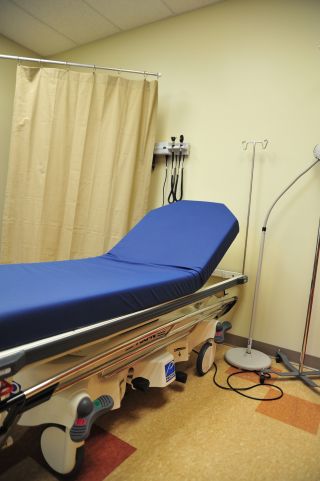Psychiatry
North Carolina's Mental Healthcare Crisis
How the pandemic put additional strain on an already overburdened system.
Posted December 19, 2022 Reviewed by Devon Frye
Key points
- The number of mental health ER visits in NC is up, straining a system already relying heavily on emergency services before the pandemic.
- Demand for psychiatric care for children tripled during the pandemic, but a lack of available beds has some children living in ERs for 6 months.
- Use of law enforcement for mental health patient transfers traumatizes patients and can put both patients and officers at risk.
- Medicaid expansion needs to be adopted and funding should support inpatient, outpatient, and alternative crisis response programs.

Like many states, North Carolina is in the midst of a crisis in its mental healthcare system. Health experts point to rising numbers of mental health-related emergency room visits, longer wait times for psychiatric hospital beds, and increases in involuntary commitments as signs of much larger problems in the state's mental health system.
Earlier this year, I had the opportunity to speak to a Health Law class at Wake Forest Law School about these issues. My recommended reading for the students was a pair of fantastic articles by investigative journalist Taylor Knopf co-published by NC Health News and WRAL-TV this past summer. The covered topics provided a framework for discussion, and I’ve summarized some of the highlights below.
More Emergency Room Visits and Not Enough Psychiatric Hospital Beds
The number of mental health-related emergency room visits in North Carolina is on the rise, straining a mental health system that was already relying heavily on emergency services before the pandemic. For example, Atrium Health, a Charlotte-based hospital group, has experienced a 65 percent increase in emergency room patients needing psychiatric care. This is partly attributable to the fact that people have nowhere else to go but the emergency room when community mental health services are inadequate or hard to find.
Children needing psychiatric care are being particularly impacted. The demand for psychiatric care for children tripled over the course of the pandemic, but a lack of available psychiatric hospital beds has resulted in children living in emergency departments for extended periods of time. My girlfriend Meredith works in the community behavioral health space and also spoke to the class about examples she’s seen of children who have been living in an emergency room for six months while waiting for a bed in a mental health facility.

Use of Law Enforcement for Mental Health Patient Transfers
The number of involuntary commitment petitions in NC nearly doubled over the past decade, and the trend accelerated throughout the pandemic. Commitment orders typically require a call to the local sheriff’s office to transport the patient to an emergency room or an available psychiatric bed.
Unfortunately, the presence of marked vehicles, uniforms, and firearms often escalates the situation because officers may not have the proper training or tools to respond to mental health calls. Many patients and their families have described being traumatized by the process, which also typically involves taking the patient away in handcuffs. A compliant patient can quickly be turned into a combative one, particularly among those on the autism spectrum.
As someone with bipolar I disorder, complex PTSD, and anxiety, I shared my own experience with patient transport when I was voluntarily committed a few years ago. Although I was cooperative, nonviolent, and wasn't threatening to hurt myself, I was told I'd have to have to be transported in the back of a law enforcement vehicle while in handcuffs attached to a chain around my waist.
Within the cramped, stuffy, steel mesh cage, I sat at an angle so that I would have room for my knees and legs. I shifted my wrists and arms to allow the handcuffs and chain to settle before finding the least uncomfortable position to rest my hands. Then I closed my eyes and tried to focus on my breathing as I skirted the edge of a panic attack for the next two hours.
In fact, many law enforcement officers reportedly aren’t happy about being in the business of moving mental health patients either. Many argue that such transfers should be handled either by mental health workers alone or as part of an alternative mental health crisis response team. Many individuals with mental health problems also have other serious medical issues, and having law enforcement professionals without adequate medical training responsible for restrained patients who may medically decompensate during transport can expose those professionals and their departments to significant liability risk.
Where Do We Go from Here?
About 20 years ago, North Carolina lawmakers shut down some state psychiatric facilities and shifted funding to more outpatient mental health services. With emergency rooms inundated with patients, attention has focused on shifting funding back to the creation of inpatient beds. Ultimately, we need to realize that it cannot be one vs. the other, it has to be both.
Stakeholders agree that North Carolinians need affordable access to readily available mental health services so they don’t have to turn to the emergency room. That will require patient access to health insurance. The Affordable Care Act expanded Medicaid coverage and provided states with an enhanced federal matching rate for their expansion populations, yet North Carolina is one of 11 states that has not adopted the expansion. Although bills for Medicaid expansion were introduced in the North Carolina House and Senate, they did not advance prior to the adjournment of the 2022 legislative session.
Experts also agree that the goal of a well-balanced system should include an array of services, including readily available therapy appointments, intensive outpatient treatment centers, community wellness centers, and psychiatric hospitals.
Luckily, there is growing bipartisan support for tackling aspects of the crisis in mental healthcare. A bipartisan group of lawmakers introduced a group of bills last year to support alternative mental health crisis response programs. The bills did not survive the legislative session, but lawmakers have signaled that they intend to try again.
References
Knopf, T. (2022). New mental health data show ‘unsustainable’ burden on NC hospitals. NC Health News, Aug. 22, 2022.
Knopf, T. (2022). Big changes are needed to turn the tide of North Carolina’s mental health crisis, health leaders say. NC Health News, Aug. 23, 2022.




